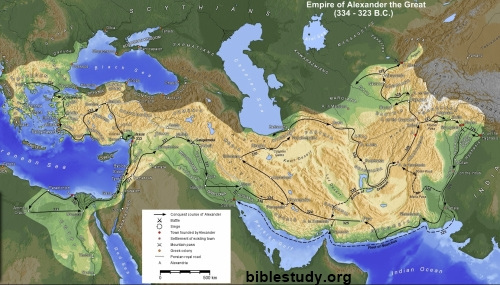Alexander III, son of Greek King Philip of Macedon, is better known with his nickname "the Great." Born in 356 B.C. he is considered by most historians to be one of, if not the, best military commanders in world history. Alexander the Great, who was never defeated in battle, controlled a vast empire that spanned most of the known world by the time of his death in 323 B.C. at age 33.
He assumed the throne after his father had unified the many states in Greece. Ruling from 336 to 323 B.C., he took to conquering many foreign lands that included Persia, Judea, Syria, Mesopotamia, Egypt and others. He also conquered lands as far east as Punjab, India. Many times, after conquering a particular territory, he built cities in order to establish his rule.
Perhaps the most celebrated city Alexander built was Alexandria (named after himself) in Egypt. It was founded around 332 on Egypt's Mediterranean Sea coast in the Nile delta region. It was peopled by colonies of Greeks and Jews. It quickly became the greatest Greek city of its time. In the first century A.D., the city became the home of one of the earliest Christian churches.
Before he died, he made military plans to expand into the Arabian Peninsula, after which he would travel west and conquer the territories of Rome, the Iberian Peninsula and Carthage. He originally dreamt of conquering by going east, as far as the "ends of the world" and the Great Outer Sea, as he conveyed to Aristotle his childhood tutor. He died in the palace of Babylon's Nebuchadnezzar II in 323 B.C. possibly from alcoholism.

Alexander's life and military conquests affected the world long after his death. His victories paved the way for the rise of Greek settlements and Greek cultural influence (Hellenistic Age) over a large area of the known world. The AMG Concise Bible Dictionary, in an article on archaeology, states the following regarding the influence his military victories.
"The widespread conquests of Alexander the Great introduced an era that brought dramatic change throughout the region of the Bible story. Greek culture and language became dominant everywhere. This had a great effect on Jewish history, bringing conflict between those Jews who gladly accepted the new ways and those who tried to resist them."
God foretold, through the prophet Daniel, Alexander's rule and what would happen to his vast kingdom after his death (Daniel 8:21 - 22, 11:3 - 4). His empire would not passed to his sons or would his kingdom be ruled by any family member. Instead, it would be divided up between his four chief generals (known in prophecy as "the four winds of heaven").
Within fifteen years of Alexander the Great's death, his family would be hit with multiple tragedies. These included the murder of his wife Statira by his other wife Roxana. His brother Aridaeus, after ruling for about six years, was also murdered along with his wife. Additionally, His son and mother Roxana were murdered by order of General Cassander.